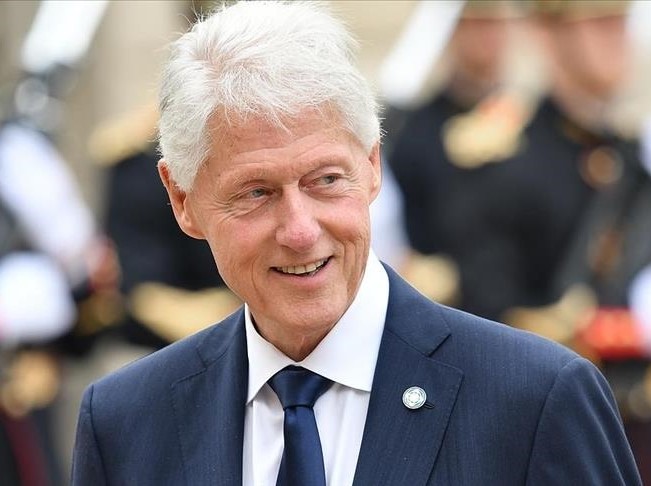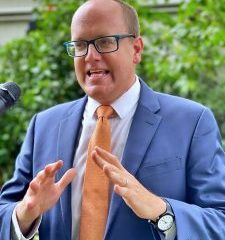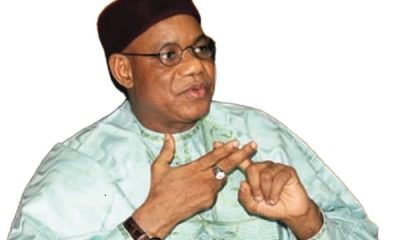Foreign News
Former U.S. President Clinton to Be Discharged Sunday

Former U.S. President Bill Clinton is expected to be discharged from hospital on Sunday after suffering fatigue, his spokesman, Angel Urena said in a statement.
The 75-year-old, who served as president from 1993 to 2001, entered the University of California Irvine Medical Center on Tuesday evening after suffering from fatigue.
He will remain overnight in a Southern California hospital following a urological infection, but he has continued to make “excellent progress” according to his spokesman.
“He is in great spirits and has been spending time with family, catching up with friends, and watching college football,” Urena said in a statement on Twitter.
Clinton’s wife, former Secretary of State and 2016 Democratic presidential nominee Hillary Clinton, was at the hospital on Saturday.
Since his admission to the hospital’s intensive care unit, he has received fluids and antibiotics, his doctors said.
Clinton, who was in California to attend a dinner and reception for his foundation in Los Angeles County, has dealt with health problems in the past.
He had quadruple bypass operation in 2004 and a procedure to open a blocked artery in 2010.
The Democrat served two four-year terms in the White House, overseeing strong economic growth while engaging in bruising political battles with congressional Republicans.
The Republican-controlled House of Representatives impeached him in 1998 on charges arising from his sexual relationship with White House intern Monica Lewinsky, but Clinton was acquitted by the Senate.
He was only the second U.S. president to be impeached. Republican President Donald Trump would later become the third when he was impeached twice during his term.
Clinton, a former Arkansas governor, has combined a folksy charm with deep knowledge of policy issues.
He defeated an incumbent president, Republican George H.W. Bush, in 1992 and then beat longtime Republican Senator Bob Dole to win re-election in 1996. (NAN)
Foreign News
Zelensky Announces New Draft Law on Anti-corruption Bodies after Protests

Ukrainian President Volodymyr Zelensky said he has approved the text of a draft law guaranteeing the freedom of two anti-corruption bodies in Ukraine – days after nationwide protests broke out over changes curbing their independence.
Kyiv’s Western partners had also expressed serious concerns over the legislation.
On Thursday, Zelensky seemed to backtrack, saying the new bill was intended to safeguard the independence of Ukraine’s National Anti-Corruption Bureau (Nabu) and Specialised Anti-Corruption Prosecutor’s Office (Sap), and to protect them from Russian influence.
He said the text of the bill was “balanced”, but did not provide any details.
The law passed earlier this week brought Nabu and Sap under the control of the prosecutor general, who is appointed by the president.
At the time Zelensky justified his decision to curtail the bodies’ powers by citing Russian influence. The day before, Ukraine’s security services had carried out searches and arrests targeting alleged Russian spies at the agency.
The passing of the legislation instantly sparked the largest protests since the start of Russia’s full-scale invasion in February 2022 in several cities across Ukraine, with many worrying the law would severely undermine the Nabu and Sap’s authority and effectiveness.
Thousands of people gathered in streets and squares across Ukraine, holding placards calling for the legislation to be vetoed.
Several commentators accused Zelensky of democratic backsliding. Their concerns were further exacerbated when Ukraine’s Western partners signalled their displeasure with the bill.
Ukraine has official EU candidate status and a spokesman for European Commission chief Ursula von der Leyen previously warned Kyiv that the rule of law and the fight against corruption were “core elements” of membership to the bloc.
On Thursday, the Commission said it “welcomed” the Ukrainian government’s decision to take action against the bill.
“We are working [with the Ukrainian government] to make sure that our concerns… are indeed taken into account,” the spokesman said.
Nabu and Sap were created in 2014-15 as one of the requirements set by the European Commission and International Monetary Fund to move towards a relaxation of visa restrictions between Ukraine and the EU.
Writing on Facebook, opposition MP Oleksiy Goncharenko noted Zelensky said that “the independence of anti-corruption institutions must be guaranteed.”
“First we take it away, and then we say that it must be guaranteed. So why was all this necessary?”
In his message on social media on Thursday, Zelensky did not acknowledge the protests or the backlash but said it was “important that we respect the position of all Ukrainians and are grateful to everyone who stands with Ukraine.”
Foreign News
US Senators Exempt HIV/Aids Funding from Planned Spending Cuts

Republicans in the US Senate have said they will spare the US-backed HIV/Aids programme Pepfar from cuts, amid a larger effort to reduce government spending.
Senators said they would end a plan to cut $400m (£300m) from the President’s Emergency Plan for Aids Relief programme, leaving total proposed cuts at $9bn.
The proposition was made in a Senate amendment to a rescissions package – meaning a bill that allows lawmakers to cancel previous funding approved by Congress.
The planned cancellations also include funds for international aid and public broadcasting.If the Pepfar amendment is approved, the bill will go back to the House of Representatives for another vote ahead of a Friday deadline.
Multiple senators from both parties had expressed concern with cuts to Pepfar, which was launched under President George W Bush and has been credited with saving tens of millions of lives around the world.
The Republican-controlled Senate can only afford a few defectors, assuming all Democrats vote in opposition. John Thune, the Republican Senate majority leader, said there had been a “lot of interest” in keeping the Pepfar funding intact.
Senator Susan Collins, a Republican from Maine, told reporters after a White House lunch on Tuesday that she was “very pleased” that the cuts would be removed.
Prior to the amendment, Collins had been vocal against the bill. She has not said whether the changes are enough to secure her support.
Office of Management and Budget (OMB) Director Russell Vought told reporters that the White House was on board with the Senate amendment, meaning that in its current form President Donald Trump would be willing to sign it.
In his second presidency, Trump has turbo-charged an effort to reduce government spending. Most of the cuts in the rescission bill are aimed at clawing back money that was previously earmarked for the American government’s main humanitarian assistance body, USAID, which recently announced its formal closure under Trump.
Trump’s moves have led to drastic reductions in HIV/Aids clinics in South Africa and other countries, precipitating a shortage of life-saving medicine and care.
Other cuts in the rescission bill are aimed at the funding for public broadcasters NPR and PBS.
Foreign News
WHO Commends Senegal for Eliminating Trachoma

The World Health Organization (WHO) has validated Senegal’s elimination of trachoma as a public health problem, making it the ninth country in WHO’s African Region to have achieved the feat.
WHO Director-General Tedros Ghebreyesus, in a statement, lauded the country for freeing its population of the disease.
“This milestone is yet another sign of the remarkable progress being made against neglected tropical diseases globally, and offers hope to other countries still working to eliminate trachoma.
”Trachoma has been known in Senegal since the early 1900s and was confirmed as a major cause of blindness through surveys in the 1980s and 1990s.
Senegal joined the WHO Alliance for the Global Elimination of Trachoma in 1998, conducted its first national survey in 2000, and completed full disease mapping by 2017 with support from the Global Trachoma Mapping Project and Tropical Data.
Trachoma control was consistently integrated into national eye health programmes – first under the National Programme for Blindness Prevention (PNLC) and later through the National Programme for the Promotion of Eye Health (PNPSO).
The country’s consistent integration of trachoma control into its national eye health programmes positioned it to significantly maintain its commitment to the elimination of the disease.
“Today we celebrate our victory against trachoma, 21 years after the one against dracunculiasis”, Dr Ibrahima Sy, Senegal’s Minister of Health and Social Action, said.
“This new milestone reminds us that our overarching goal remains a Senegal free from neglected tropical diseases.
“We are fully committed to this, and we are making good progress, notably against human African trypanosomiasis (sleeping sickness) and onchocerciasis”.
Senegal implemented the WHO-recommended SAFE strategy to eliminate trachoma with the support of partners, reaching 2.8 million people who needed them across 24 districts.
These activities included the provision of surgery to treat the late blinding stage of the disease and conducting antibiotic mass drug administration of azithromycin donated by Pfizer through the International Trachoma Initiative.
Similarly, public awareness campaigns were carried out to promote facial cleanliness and improvement in access to water supply and sanitation.
Trachoma is the second neglected tropical disease to be eliminated in Senegal. In 2004, the country was certified free of dracunculiasis (Guinea-worm disease) transmission.
Senegal now joins 24 other countries that have been validated by WHO for eliminating trachoma.
The 24 countries are Benin, Burundi, Cambodia, China, Gambia, Islamic Republic of Iran, Lao People’s Democratic Republic, Ghana, India, Iraq, Malawi, and Mali.
The others are Mauritania, Mexico, Morocco, Myanmar, Nepal, Oman, Pakistan, Papua New Guinea, Saudi Arabia, Togo, Vanuatu, and Vietnam.
These countries are part of a wider group of 57 countries that have eliminated one or more neglected tropical diseases.
WHO is supporting Senegal’s health authorities to closely monitor communities in which trachoma was previously endemic, to ensure there is no resurgence of the disease.
“Trachoma has cast a shadow over communities in Senegal for more than a century.
“This long-awaited validation is not only a milestone for public health but a powerful tribute to the tireless dedication of frontline health workers, communities, government leaders, and partners who never gave up,” Dr. Jean-Marie Vianny Yameogo, WHO Representative in Senegal, said.
“Today, we close a chapter that began over a hundred years ago, united with pride, gratitude and resolve. WHO remains committed to supporting Senegal as the country continues to lead in sustaining this hard-earned achievement.”
Trachoma remains a public health problem in 32 countries, with an estimated 103 million people living in areas requiring interventions against the disease.
Trachoma is found mainly in the poorest and most rural areas of Africa, Central and South America, Asia, the Western Pacific and the Middle East.
WHO’s African Region is disproportionately affected by trachoma, with 93 million people living in at-risk areas in April 2024, representing 90% of the global trachoma burden.
Significant progress has been made in the fight against trachoma over the past few years, and the number of people requiring antibiotic treatment for trachoma in the African Region fell by 96 million from 189 million in 2014 to 93 million as of April 2024, representing a 51 percent reduction.
There are currently 20 countries in WHO’s African Region that are known to require intervention for trachoma elimination.
They are Algeria, Angola, Burkina Faso, Cameroon, Central Africa Republic, Chad, Côte d’Ivoire, Democratic Republic of the Congo, Eritrea, Ethiopia, and Guinea.
The others are Kenya, Mozambique, Niger, Nigeria, South Sudan, the United Republic of Tanzania, Uganda, Zambia, and Zimbabwe.
A further 3 countries in the Region (Botswana, Guinea-Bissau and Namibia) claim to have achieved the prevalence targets for elimination.




























